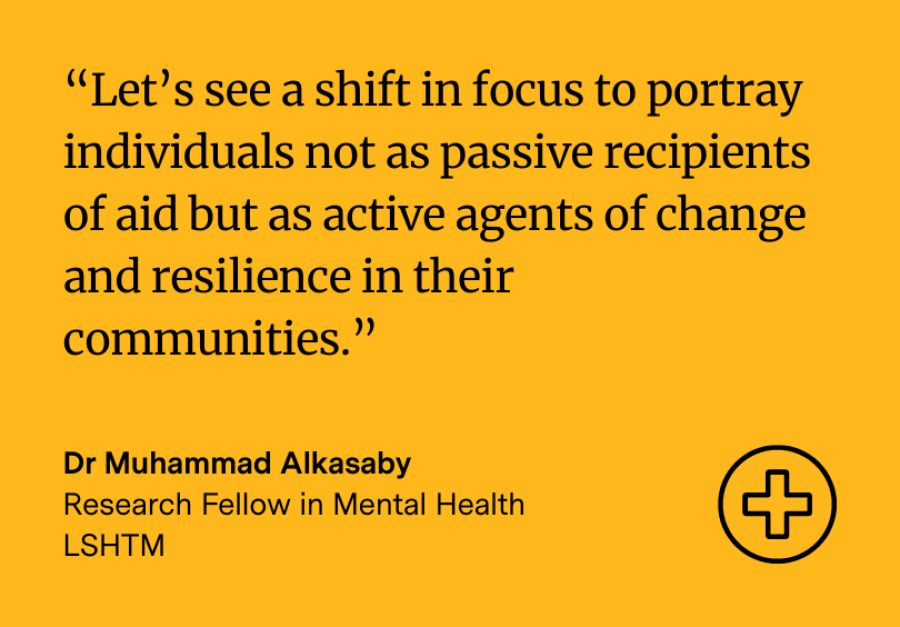
Dr Muhammad Alkasaby, LSHTM Research Fellow in Mental Health and Deputy Director of the Health in Humanitarian Crises Centre
I recently came across several humanitarian funding campaigns on social media that use photos of malnourished children wearing dirty clothes, carrying food in their hands. It made me question: how would these children and their families feel seeing their images used this way? What long-term effects might this have on their self-perception and mental health? And does this kind of messaging align with humanitarian sector efforts to decolonise aid?
In this blog, I explore how humanitarian aid and narratives around it can impact the mental health of people affected by crises, and how to ensure humanitarian aid is more empowering.
Enforcing suffering narratives
Despite much progress in this area in the last decade or so, humanitarian organisations still sometimes portray conflict-affected populations in ways that emphasise their suffering, helplessness and despair to inspire sympathy. While this approach might be effective for fundraising, it can enforce a narrative of helplessness and victimhood, undermining crisis-affected individuals’ sense of agency and hope for a return to normal. Such messages can also be paternalistic and may echo colonial assumptions about the need for external actors to rescue conflict-affected populations. LSHTM has worked with organisations like PositiveNegatives to present the lives of conflict-affected populations in ways that recognise their agency, in collaboration with local actors themselves who decide how they want to be depicted.
Overlooking community strengths
This suffering narrative portrays communities as passive recipients of aid. Consequently, the strengths of affected communities, such as their ability to cope with adversity and their existing support networks, may not be considered as a part of the response to crises. In the long term, this could increase dependency on aid and promote a sense of powerlessness. While external aid is often essential, it's equally important to recognise and build uponthe existing strengths, resources and coping mechanisms within local communities.
Re-traumatisation
People affected by crises are often interviewed by humanitarians agencies as part of needs assessments or research. These interviews may be conducted with the same individuals on multiple occasions due to a lack of coordination between humanitarian actors. Such interviews often focus on traumatic experiences which can be triggering to recount, especially if there is a lack of proper psychological follow-up support in place – which is often a challenge due to limited resources within humanitarian settings.
Pathologising normal responses
One challenge in mental health practice is the tendency to pathologise, or medicalise, normal, adaptive responses to traumatic events. In crisis settings, fear, sadness, or anxiety are often natural reactions to extraordinary stress. However, labelling these emotional responses as symptoms of mental illness risks diminishing the resilience and coping capacities of affected individuals. Humanitarian teams must differentiate between distress that requires clinical intervention and natural emotional responses to adversity, ensuring that support services empower rather than stigmatise individuals. In fundraising campaigns, too, let’s see a shift in focus to portray individuals not as passive recipients of aid but as active agents of change and resilience in their communities.
By making these changes as a humanitarian community, we can better support and empower those affected by crises, acknowledging their strength, dignity and resilience. In this way, humanitarian aid can not only address immediate needs but also better support long-term mental health resilience and recovery.
LSHTM's short courses provide opportunities to study specialised topics across a broad range of public and global health fields. From AMR to vaccines, travel medicine to clinical trials, and modelling to malaria, refresh your skills and join one of our short courses today.
